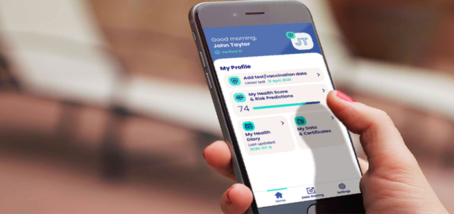-
ROSSLARE EUROPORT TARGETS HEALTH & SAFETY WITH CAMERA TELEMATICS PARTNERSHIP - 2 days ago
-
Landmark Study Reveals Wearable Robotics Significantly Boost Safety and Efficiency in Industrial Environments - July 24, 2024
-
Visku Tackle The Retail Seasonality Challenge One Pallet At A Time - July 22, 2024
-
KAMMAC AND BERGEN LOGISTICS STRENGTHEN FASHION & LIFESTYLE SERVICES IN THE UK - July 19, 2024
-
TENTBOX EXTENDS PARTNERSHIP WITH ARROWXL TO SUPPORT INCREASING DEMAND - July 17, 2024
-
The Perfume Shop improves customer journeys while driving profitability in partnership with Scurri - July 17, 2024
-
ZEROMISSION SECURES £2.3M ($3M) INVESTMENT TO ACCELERATE ELECTRIC FLEETS - July 16, 2024
-
BCMPA CELEBRATES SUCCESS OF 2024 CONFERENCE - July 15, 2024
-
Best of the Best: Jungheinrich Celebrates Triple International Award Win - July 12, 2024
-
GOPLASTICPALLETS.COM CALLS ON NEW CHANCELLOR RACHEL REEVES TO CONSIDER PLASTIC PACKAGING TAX REFORM - July 10, 2024
Klarity developed to predict, monitor and test health and safety of workers
With the threat of a second nationwide lockdown, an AI employee health data management tool is offering a lifeline to logistics companies which are under pressure to maintain a safe working environment and minimise disruption to operations.
Created by Delfin Health and DocHQ, Klarity can help them remain operational by predicting, monitoring and testing the health and safety of their diverse workforce. It can give them a real-time clinical understanding of the health of all staff working across multimodal transportation, freight forwarding, warehousing and inventory management.
“If logistics companies are to stay open, they need to be able to monitor the health and safety of their workforce in the most efficient way,” says Will Cooper, Founder and CEO at Delfin Health. “They need to follow safety protocols such as social distancing, forming bubbles, increasing cleaning and limiting the handling of goods to others. Introducing daily symptom checking and risk assessment is also critical, especially as logistics workers visit high risk places. This is where assessment tools like Klarity can help.”
The comprehensive solution will enable logistics companies to address their employees’ anxieties associated with returning to a safe work environment and about the future. It offers health risk assessments using explainable AI to determine the severity of Covid-19 for each employee. It also offers accurate and ongoing testing to assess their Covid-19 status, and continuous surveillance and symptom checking to inform and reassure employees.
The various testing methodologies, which include group and randomised testing, allow employers to reduce the amount of testing required and minimise the risk of an outbreak in the currently active workforce, in particular by identifying asymptomatic cases which are thought to play a significant role in the transmission of the disease.
The testing process, based on World Health Organisation (WHO) protocols, is guided by healthcare professionals who oversee and validate the results and use accredited tests including Polymerase Chain Reaction (PCR), Enzyme-Linked Immunosorbent Assay (ELISA), Saliva (MHRA approved) and Rapid RT-LAMP and, where relevant, rapid antibody tests. Further follow-up consultations can be provided as required.
Will adds: “It’s not enough for employers to simply rely on people using the test and trace government solution which tests only symptomatic people. With logistics facilities typically involving close contact, and vehicles often involving travelling passengers, a systematic process of regular testing is required. While regular testing might appear to be cost prohibitive, logistics companies using our technology can reduce costs by between 50-75% while also limiting the risk of asymptomatic spread of the virus.”
For more information on Klarity, visit https://covid.getklarity.io/

































